Before we jump into our conversation with today’s guest I want to let everybody know that the Wellness Show presented by Nestor’s Market is back in Vancouver, March 26 and 27 at the Vancouver Convention Center East Building. For more information, you can visit their website at www.thewellnessshow.com.
Ashley: Thank you so much for joining us on Filled Up Cup podcast today. Rebecca, for anybody who’s unaware, she has been blogging since 2007. She’s had her food blog since 2012. Your first cookbook came out in 2017, that was AquaFabulous and your newest cookbook is called Vegan Baking Made Easy.
Rebecca: Thank you. It’s great to hang out.
A: What was your inspiration behind wanting to make cookbooks?
R: You know what’s really funny about me making a cookbook is that up until someone even suggested the idea to me, I had completely dismissed it as an option. I’ll explain why and I know that sounds kind of like why would you dismiss something? I have been writing a recipe blog for like a really long time, but primarily my recipes I’ll go and I’ll be inspired by something an ingredient, a season like it’s Lunar New Year right now, you know? So we’re in January and so I’m very inspired by Asian ingredients right now, just for example, and then it’s going to be February and we’re going to be doing Valentine’s day and so I’ll be inspired by something like that. So I get inspired by something I’d get an idea for something and I would basically like Google a recipe and then I would take that recipe and I would make it my own by creating some kind of twist on it or whatever that looked like. So I never considered myself to be an actual recipe developer.
I was at a blogging conference in 2015 and I gave a presentation and this guy came up to me afterwards and he introduced himself and he said; “Hi you know I’m so-and-so from Robert Rose books…” and I was like, “oh yes, I know your stuff I have your books on my shelf.” He’s like, “have you ever thought about writing a cookbook?” I was like, “oh no, no. Like, that’s no, that’s way too hard. I could never do that,” but he gave me his card and I thought about it for probably six months or almost a year. I started pitching him ideas and the experience of writing a cookbook was really hard, but it was also really awesome because I consider myself to be what’s called a recovering perfectionist. You can’t see my air quotes, but I’m putting them in air quotes. I’m what I considered to be a recovering perfectionist. For me dealing with failure on such a level. So when you’re a recipe developer, all you do is fail. Like you just fail and fail and fail and fail until you don’t fail anymore. You know what I mean? Like every time you’re creating a recipe, you’re like what if I put this in? What if I put this in? Then you’re like, oh boy, no that’s, that’s a hard pass.
How The Book Found Rebecca
A: Right.
R: You know what I mean? And that’s a failure. The failure is always a stepping stone to the success, right? The failure is okay. That was a no, but what if we do this? Or what if we do less of this or whatever that is until you get the recipe to where you’re happy with it. So it was such a really fantastic learning experience for me. I am a writer. I’ve always been a writer, but I’d never done anything like this before. And it was such a great learning experience. Like I learned so much from it. And then did a second one, right? Like,
A: Well, and good for you for stepping out of your comfort zone and sort of putting yourself in a new situation to know that you can do hard things. What a great lesson in life too that you know, even as a recovering perfectionist, it’s like, we always just kind of have to fail and fail and fail until we’re like, oh, I can do it.
R: Yeah. And like, honestly, it was just such a good life lesson for me to learn. Yeah, it was just, it was a really great experience in retrospect, when I was in it, it was really hard, you know what I mean? But I love the idea of challenging myself to do things that I’m terrified to do. I sort of try to have tried to carry that through my life you know like, “oh no, I’m this thing scares me. Okay, well maybe I should try doing that.”
A: We never changed in our comfort zone, so it really is important that we kind of scare ourselves into doing those like hard things. And you I’m sure have that too with whether it’s writing in the blog or whether it’s planning a trade show. Cause they know that you do that here as well.
R: Yeah.
A: …and by here, I mean, in Vancouver, British Columbia, where we’re both located
Don’t Chase Perfection
R: Yeah, I do some work with I do some work with a trade show called the wellness show which is really great. I really love working with them and working with them for a really long time. I really enjoy that. I had a really interesting experience, happened to me a couple of months ago. So I am a woman of a certain age. Like I won’t tell you what my actual age is, but let’s just say I’m not in my twenties. Right? Well, we’ll say that. We’ll say I’m somewhere in the middle part of the lifespan. Right. And I had done. Again, another thing that I was like, “oh my God, I’m super scared to do this, but I want to try doing it.” I had done some fit modeling for a local lingerie brand a few months ago. This was like right after Christmas, they emailed me and they were like, “Hey, we’re having a photo shoot. Would you come down and be in this photo shoot?” And I was like, “Oh, my God.” I’m a very real woman. I have a very real body, I have smushy bits. I have had a child you know, like I’m not a model. Let’s just be super clear about that. Right. And I was like, really, again, it was like very similar. I was like really terrified. And I was like, you know what? I want to do this because I want to. In a weird way. I was like, I want to celebrate my body, like my imperfect non-model body. And also I was like, look, if you guys are asking me to come down and model your bras, then who am I to say no, like who might’ve say my body isn’t good enough to be a lingerie model. Right. I say that with my tongue and cheek, like, obviously I’m not a lingerie model, but you know what I’m saying?
A: But at the same time, If we all have those bits and pieces, then like if we have breasts to put into a bra then we kind of are all bra models. And I think that how nice for people say younger than us to be able to see real bodies and know that that, you know, ideal, perfect 20 year old body, it really doesn’t last that long, unless you’re super hyper-focused. On having it last a long time. And in a lot of cases, even when our younger selves, like I remember thinking, oh my gosh, I’m so fat or I’m so this or whatever. Abs, and now looking back on it, it’s like, oh, you’re like, oh my God. Yes. So I think in that case, we’re always in our own heads about it. There’s no perfect. Even the people that we really look at in most traditional marketing campaigns, they don’t even look like that in real time.
R: Nope. They do not. Right. It’s hard, it’s hard to make yourself do these things because the voices in your head are always like, you’re not good enough or, you know, whatever that is. I try to push myself past those things if possible. And you know, the reward is always there. I didn’t walk out of that. Photo-shoot feeling like I was less than I walked out of that photo shoot, feeling like a million bucks, you know?
A: Exactly, and we do really have to, to just appreciate our bodies and be thankful for what they do give to us. If there’s stretch marks or wrinkles or cellulite or hair or whatever, the things may be, it’s always a bigger deal in our own heads. And then the quality of the time other people don’t see our bodies and think that way, like for whatever reason, we’re conditioned just to be so mean and horrible to ourselves.
R: I don’t know. And that, and, and on top of that, like, think about the amazing things. Like my body created a human being. Like my body made a person like that’s amazing to me. My body made a person and then I consequently kept him alive for two years with just my body do you know what I mean? Like, wow. Wow.
A: Now we have like full fledged. I think yours is a little teensy bit older than mine. Mine’s turning 15 this year. How old is Michael? He’s 18. Yeah, that we created like actual, almost grownups to go out and potentially make other humans.
R: He’s so great. Yeah.
A: I would imagine teenage boys and teenage girls are a little bit different potentially with. Just like the hormones. I feel like there’s always that old age thing that like little boys can be harder. And then once they’re teenagers, like they’re back to loving you a little bit more little girls are like, supposedly a little bit easier when they’re little and then they just hate you their teenage years.
R: In the teen years… yeah.
A: That’s the phase that I’m in right now. So I’m looking forward to like gracious, like nice and normal and she wants to be around me again.
R: Oh boy. Yes.
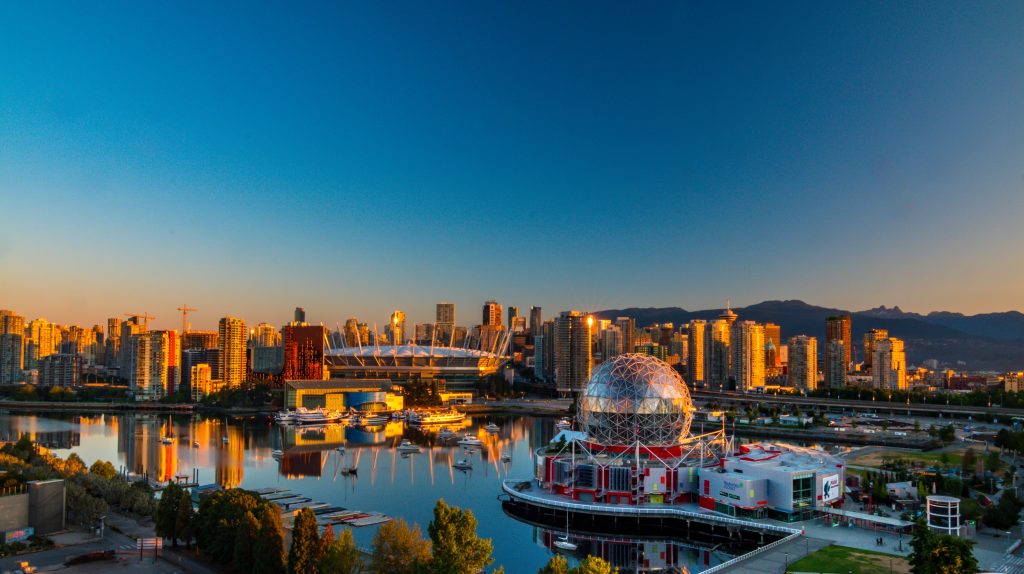
A: But I guess that’s also like another fantastic thing about being in Vancouver and as having so many things to do so, whether it’s going and having like a restaurant or being out and about, she’s still kind of willing to do that with me or movies when those were still open and like decent things were coming out. For people that love vegan food or interested in trying more vegan restaurants. Are there any that you just absolutely love in Vancouver that you recommend?
Vancouver’s Amazing Vegan Food Scene
R: Oh my gosh. Yes, absolutely. So I think first of all, living in Vancouver, we’re so lucky to live in Vancouver. We have such a vibrant food scene here, full stop, but also we have such a vibrant vegan, vegetarian food scene here. So amazing the options that we have in the city. So in a lot of places where you go, maybe you’ll go to a restaurant and they’ll have a few vegan options on the menu here in Vancouver, we have restaurants that are fully a hundred percent vegan. Like there’s no animal products in that restaurant whatsoever. We are so lucky to have those here. There’s so many choices. I just love it. So how, oh man, like what? Oh boy. Okay. So I have to kind of break it down into categories. So pizza: Virtuous Pie opened here a few years ago – the original flagship is in Chinatown. Now they’ve opened up a bunch of others as well, including in Portland, which is amazing for them: they do this vegan pizza. All of their pizza is vegan. It’s so delicious. I took Michael with me when they opened and Michael was. I’m not going to like that. Right. He inhaled it. Like he hoovered that thing down, like a very diehard, like kind of meat type type of person. And he loves it. He loves their pie he loves Virtuous Pie for kind of more like comfort food kind of stuff. We have a bunch of great options. What is called MeeT on Main. They’re really great. I love there’s a place called Chickpea that I love. They serve the. Chick pea fries. So what they do is they take a chick pea flour. Blend it up make almost like a polenta out of it. Cut it into like large chunky fries and then they deep fry it and then they have this like these, oh my God. It’s just literally, it’s so good. Like, they’re so good. You know, we have vegan ice cream in the city, so people like Say Hello Sweets and, there’s a bunch of other ice cream places. Where you can go there’s loads of vegan ice cream. It’s like, we’re just, honestly, we’re so lucky. And then there’s a couple of more kind of like upscale places, which are really great. So there’s a place that just opened a little over a year ago in Chinatown called MILA. And they’re like, kind of like an upscale vegan restaurant and their stuff is so delicious. Just this weekend, I’m going to Night Shade, which is a new one that just opened up in Yaletown and I’m very excited to try that.
A: Yeah, we are really lucky. There’s so many fantastic places here. Do you think that there’s one city and maybe it is, Vancouver. That if you were vegan or into plant-based food that you’re like, I need to go to that city because they have like, the best?
R: Yeah. I think probably Germany because they have a huge vegan population in Germany. So I would love to go to Germany, like to go to Berlin or one of those cities where they have like a really big vegan population. Also, I think like many Asian countries are very naturally kind of. Go that way. So I’m thinking about places like Vietnam and Thailand and even India where, you know, like Indian food is quite often vegetarian and vegan because so many people there don’t eat meat just naturally because of religious reasons. So, there’s so many places, oh my goodness. So many places I want to travel.
The Need For More Female Chefs
A: Me too. I miss being able to explore the world without any restrictions. Now, one thing that I think the whole restaurant industry needs more of is female chefs. Yeah. So I know in Vancouver we have some, but we don’t have nearly enough. What are some places if somebody wanted a female led kitchen, what are some of your favorite places that have female chefs?
R: Sure. So Dawn Doucette opened her own restaurant. She used to work with Earl’s. When I first met her, when she was competing on top chef Canada. And now she’s opened her own place. It’s over in the North Shore little tiny place it’s called Douce Diner and it’s the super cool, like 1950s kind of vibe to it. The food is really beautiful and fresh and delicious, and they do great fried chicken. I haven’t eaten it because I don’t eat chicken, but their food is really, really good. It’s everything is so fresh and delicious and just really amazing. So I really love that. Burdock & Co is owned by a female chef. She’s amazing. Andrea. She’s just absolutely fantastic. Burdock & Co is one of the best restaurants in the city, just like so great. There’s a really upscale restaurant in sort of on the edge of Chinatown-ish, Gastown, Chinatown-ish called PiDGin. And that’s being there. Chef there is nonbinary and they just competed on top chef and came in: 2nd… 1st or second, really, really did really, really well anyway. And their food is really fantastic as well. So we do have some, but I, I genuinely feel like we need more. There’s a few other ones as well, but they’ve kind of left, you know? The executive chef up at. Shinjin used to be a woman, but she, you know, she’s gone and. There was a really fantastic place on Broadway called Cheecha, which was this really unique Peruvian restaurant that was run by two gals. And that’s closed only because of the sky train that they’re putting in there. The building that they were in ended up being demolished because there’s going to be a SkyTrain station there or something. So they’re closed. So, yeah, it’s a tough one. But yeah, I really do. You know, focus on and, and support women led restaurants, if at all possible.
A: If anybody who has high schooler kids and they’re trying to figure out what’s the best industry for you to go to restaurants definitely could use help right now, but they really do need, I think in all restaurants or all kitchens and all places, we do need more women working.
R: We really do. Yeah.
A: Now thinking back towards your cookbooks again, what was the inspiration behind, the themes in your book?
R: So both of my books were kind of. How do I say they were both kind of mandated is the wrong word, but essentially what happened with my first book was I had some ideas around cookbooks that I wanted to pitch to them, to Robert Rose, their Canadian publisher out of Toronto. They publish cookbooks primarily. And I had some ideas for what I wanted to pitch to them, and I did pitch them a few ideas. But then one day I was emailing back and forth with the editor with the, the guy who’s who runs the place. I had said to him, something really off the cuff, like, “oh, you know if you don’t already have something in the works for aquafaba, you should. You should think about that because aquafaba is really hot right now in the vegan world.” And so for people who don’t know what aquafaba is aquafaba is , basically what you do is you take a can of like beans, some kind of beans. I usually use chickpeas or some kind of white beans, and a lot of people make like hummus, for example. So when you drain the water out of that, can of beans, most people throw it away. It’s kind of a little bit slimy and it’s a bit. And however, some brilliant person somewhere along the way, I don’t know who this person was that thought of this, but some brilliant person somewhere along the way, decided what would happen if I whipped this up, it’s a very egg white like consistency and what would happen if I started trying to whip it? Well, as it turns out, you can take bean water and put it in and you start whipping it. It acts exactly like egg whites. It creates this really beautiful light, fluffy merengue that is completely vegan. Like it’s an insane concept. It’s a totally crazy concept. Like the first time I did it, I was like, come on, there’s no way this is going to work. And I’ve now done it hundreds of times. And literally every time I do it, I’m like how, how, how. So I have been playing around with aquafaba in my kitchen and just having some fun with it, making meringue making different things. I pitched him and I sent him this email and he was “like, well, why don’t you write it?” Because I’m not the world’s foremost expert on aquafaba. You know what I mean? I was like, I don’t, and he was like, well, You know, and I had a lot of conversations with some of my friends and basically where my friends said to me straight up, she was like, “if you don’t write this book, someone else is going to, so you should write it.” And I was like, huh, that’s a good point. And so I wrote it and my second book. Was a conversation the same. It was a conversation with the publisher. The publisher came to me, they were like, Hey, would you be interested in writing a book about vegan baking basics? And I was like, yeah, that’s in my wheelhouse. I can totally do that. And so, yeah, neither. Sort of chose that. Like, I they’ve kind of chose me. I didn’t really choose them. But it’s amazing how much you learn about something when you have to write a book about it, even if you’re not an expert before you start, you’re an expert by the time you’re done. Right?
A: Yeah. And I think sometimes there is that myth of, I have to know all of these things before I jump into it like, it’s one of those things, like you said before, it’s very trial and error until you get it. Right. So I think that is cool that you found something that maybe there wasn’t so many books on. More people, an opportunity to look for your book as well.
R: Yeah. It’s very niche for sure. There’s this thing like, for example, so you’re doing a podcast right now. Like where are you an expert on podcasts before you started a podcast?
A: No, definitely not. No.
R: Do you know what I’m saying? Brene Brown has this really great thing that she talks about that I absolutely love. And I try to remember this all the time and she calls them, can I say. A lot of bad words. Okay, good. I didn’t, it’s not even me. It’s Brene Brown said the bad word anyway. So Brene Brown has this thing. She calls them FFTs and an FFT is a fucking first time. Right. So anytime you do something the first time, you’re like, oh my God, why do I suck so badly at this? Right. But it’s like, we live in this world where we automatically assume we do something for the first time and we’re going to do it a hundred percent. Perfectly correct and that’s just not true. Right? The reality is, is that you have to do something, you have to practice, you have to do it over and over again. You have to learn, you have to figure these things out. Right. And I love that. I think we need to, we need to think about that more. We need to think more about I’m trying this thing for the first time. You know, and I’m going to suck at it and that’s okay. You know what I mean? Like I have a friend who is a really big YouTuber. And he says this all the time. He says, like, if you go back and look at my first videos, they’re terrible. Right. They’re awful. You know, and that’s okay. Everyone’s is right. Like nobody is a perfect YouTube or the first time they try it.
A: No. And we really do have to let ourselves off the hook with that. And I think be patient, I think we’re so used to everything happening right away. Or maybe seeing other people do things great. We forget that they sucked at one time too, or they were new too, or they were critical of themselves to. It’s like, we all have to start somewhere. I think sometimes, and especially the older you get, it becomes more frustrating learning things new because we’re like, we should just know that.
R: I’m old. I should know these things or when you make the same mistake again and again, and again, and again, like, I don’t know, maybe with relationships or something, you know, I definitely know harder than this. How did it get to this point in my life?
A: How did I keep dating the same guy in different bodies?
R: Exactly. A hundred percent.
A: Have you always been vegan or has this
R: No and I’m not even a hundred percent vegan. I’m vegetarian basically. So no, I’ve never, I have not been, I, my day is probably about 80% vegan, something like that. I’m not a hundred percent vegan. I stopped eating meat. I’ve sort of been off and on vegetarian for a lot of my adult life. But the last time I ate meat was 2015, 2016 so it’s been a while.
A: Was it just because you felt like the plant lifestyle was like a healthier diet for you, or was there something that kind of turns you off of wanting to eat meat?
Vegan Food Can Be Comfort Food
R: I still adore any kind of comfort slash junk food. If you have a look at my blog, you’ll notice that there’s a lot of junk slash comfort food on there, but it just happens to be vegan, vegetarian, you know? I wrote an entire cookbook about baking. Like I’m an equal opportunist junk food person. I just think, why should just the meat eaters be able to eat good junk food? Vegans, vegetarians deserve good junk food too. So, you know, that’s part of it for me. No, for me, a hundred percent, it was about sustainability and the environment. And don’t get me wrong. A lot of people become vegan or vegetarian because of compassion reasons. And I totally get that. And I’m by no means saying. You know, we should abuse animals, livestock, and especially factory farming is not good. We all know this. Right. But for me, it was more around environmental and sustainability reasons just because eating a more plant-based diet is just better for the environment and it’s more sustainable. And so I don’t really, honestly, it’s not a conversation that I really have with a lot of people. I know a lot of people. Sometimes experience a lot of judgment and I’m just saying that because when I talk to somebody, if I meet someone new and I tell them that like, I’m a vegetarian, the first thing they do is apologize to me for eating meat. Like if I’m going to a restaurant or something, and I’m having, you know, like it’s a group of people that I don’t know, the first thing they do is they’re like, oh, I’m really sorry. I’m eating meat or whatever. And I’m like, that’s okay. Like, you can eat whatever you want to eat. I’m not trying to convert the entire world. All I’m trying to do is to try to get people, to eat less meat by giving them delicious alternatives. Right. So, if you want to one day a week, say for example, have like a meatless Monday or something like that, just one day a week, like that can make a huge difference. Right? And if you can do that in a way where your kids are like, oh my God, this is delicious. You know, this veggie burger is really tasty then, like you don’t even feel like you’re giving, something up. Right.
A: I think that there’s not a wrong reason. I think that all of the reasons are valid and that whatever motivates you to make those choices for you is the right motivation. We are so fortunate that I think plant-based foods in general have come so far that you could be eating a burger and you can’t tell the difference.
R: Like, and some of them really are very convincing, like the beyond stuff. We have a local supplier here in Vancouver called Tomorrow brand foods, T M R W tomorrow brand foods. And I like to support them over something like the beyond or the impossible’s. Not that those aren’t delicious products, but. I just like to support a local company if possible, again, it’s about sustainability and the environment. So if we’re eating stuff that comes from a shorter distance, then it’s better and also to support a local business. But yeah, these guys make the most amazing veggie burger. It’s so delicious. So good. Just so good. Right.
A: Do they do it via a restaurant or they do it into a local like delivery chains.
R: I think some local restaurants are now starting to serve their stuff. But yeah, you buy it at the grocery store basically.
A: Which I do love that. I love going to the grocery store and being able to see that it’s local and that we’re not just buying like Mexican US-based food.
R: Yeah, totally.
A: Over the last years, we kind of learned the benefit of not depending on foods from other places and to really shop in our own backyard as well.
R: Really like so much. So like if that flood that we had a couple of months ago taught us anything, right. It was like, holy man. Yeah, scary stuff.
A: Literally my backyard, we were evacuated for like two weeks it was brutal. Although we didn’t actually flood compared to a lot of the families that had flooded out in the sumas prairies in Abbotsford and local surrounding areas and into Washington state was scary. Now, when you’re talking to people that maybe think plant-based foods. Are going to be a certain way. What is like a one easy meal that you would suggest that kind of would help them dip their toe into it and like an easy swap out? I don’t know that I’m eating plant base type meal.
Pasta Dishes Are A Great Starting Point For Eating Vegan
R: Oh my gosh. Okay. Well really anything with pasta? Like if you’re eating a pasta kind of dinner, Like you don’t really need a lot of meat in pasta. What I love about Italian food is how simple it is in its real basics. But they use this really beautiful quality ingredients, so something really simple, like a pasta dish that includes like maybe some pesto, which is easy enough to do. Like some vegetables, that kind of thing. Like something like that is really easy to do. I’ve been loving this recipe recently. I’ve used it quite a lot. This recipe from Jillian Harris’s cookbook Jillian Harris. And what’s her name? Tori can’t remember her last name. What her last name is anyway, it’s called Fraiche Food Full Hearts full hearts and there’s this really great recipe in there for a butternut squash, pasta dish. Basically we do stick a butternut squash, cook it down. And then you just blend it with some nutritional yeast and a few other things. And it makes us really beautiful, like really creamy sauce. And then you take fresh sage leaves and you fry them. And so they have this like really beautiful kind of like smoky crispiness to them. And you kind of sprinkle that on top. It’s just so good. So yeah, I think pasta. A really great thing. All kids like pasta, I don’t know any adults that don’t like pasta, you know, like I think it’s really easy to do something like that. And then if you’re interested in exploring some of the like meat non-meat vegan non-meat type products, there’s a lot of things out there that work kind of like a ground beef, for example, that you could sauté that up and put it into a tomato sauce, you know, just things like that are really actually quite simple to do.
A: I think the important thing for people, like I not, especially in the last little while, I’ve kind of fallen out of the habit of like cooking. But I plant based meals, aren’t that much harder than making like a regular meal. Like it’s not really challenging or any more time consuming.
R: I think when people think about eating plant-based they think about. The like buddah bowl or like the big salad or things like that. And it’s not that that isn’t like, certainly that is plant-based and definitely it is, but I consider it to be, I almost think of that as being like old school vegan. Like I think of it as being like the nom, you know what I mean? As opposed to. A restaurant like Mila that is doing these really beautiful, like very elevated vegan dishes, right? So less of the, kind of like raw vegetables or like raw roasted vegetables in a bowl with like some sauce and more of like, for example, did you some like really amazing stuff that they’re doing, like they have this beautiful, mushroom pasta dish, that’s like super creamy and comforting and like so good. And you know, it’s just really, you really can do it. And there are so many great substitutions out there now, too, you know, like there’s butter substitutes, there’s milk substitutes. There’s an amazing egg substitute now called Just Egg fantastic. Like, it’s so good. I was like, how is this not actual eggs? Like it tastes so real. Right.
A: I think the one food that I found that for me personally, I just can’t find a dupe that works the same or that tastes the same is cheese. Any like vegan, either vegetarian cheese or you’re like it’s kind of closed or do you kind of share my opinion that the most of them are gross?
Vegan Cheese, Are Any Actually Good?
R: I think that part of the reason why I haven’t gone full vegan yet is really because of cheese. Like, I’ll be honest with you. I haven’t. deep deep cheese addiction. I really love kind of weird cheeses and stuff like that. You know, ones that are super funky and that kind of thing. Okay. So yes, but also there are a couple of places that are doing some really great stuff. So first of all, Speak again about women led and local. There’s a local brand here called Blue Heron Creamery. And Karen McCarthy has been creating vegan cheeses for, I don’t know, it’s been quite a while now. It’s been 5, 6, 7 years that she’s been doing this. And all of her cheeses are a hundred percent vegan, but she uses traditional cheese making techniques. So she’s using coconut milk and cashew milk, but she’s inoculated. The milk with bacteria and then creating like a very traditional, actual cheese. A lot of the cheeses that are commercially available, vegan cheeses that are commercially available on the market are, you know, they’re thickened with. Cornstarch and Caregeon in and that kind of stuff. I don’t have any problem with those things. But what I love about what Karen is doing is that she’s doing very, very traditional cheesemaking techniques, but on non-traditional ingredients. She is just such a pioneer in her field. There’s maybe six or seven people in the world that are doing the kind of stuff that she’s doing. Like it’s absolutely amazing. And she’s Vancouver based and. Their business is really taking off. So I’m just like so happy for them and their stuff is really good. There are more and more options all the time now, which is really great. There’s one that I like called Parmela Creamery. Although I think they might be American and not local, but their stuff is really melty. Like the cheese actually melts like actual cheese. So yeah, if you can find something that works for you, then for sure, like go for it. There’s some, there are some really good ones out there but I know I’m, when you can replace a really good French, you know, oozy Brie or really delicious blue cheese, you know, we’re a manchego or something, then yes, I will go fully vegan.
A: Is there is there so many fantastic cheeses out there. And I do think a lot of like the soy based or the plant base. They’re good, but they’re just. Good enough at this point. Yeah.
R: But try Karen stuff. Her stuff is all available at save on foods. And yeah, and they’re, they’re just doing so well. I’m so proud of them. They’ve come so far and their stuff is really, really good. She does a thing called Cumulus, but it’s kind of like a chev. It has kind of like shove kind of like consistency and also that kind of acidity, tartness that you get from goat cheese. It’s really good.
A: And I do like the fact that she’s using traditional ways and kind of thinking outside the box while being inside the box.
R: Exactly
A: So we’ve talked a little bit about the idea of vegan or vegetarian based foods being harder to cook or more time consuming. Are there any other myths about the lifestyle that you’d like to see kind of disappear? I think one that comes to my mind is maybe that. You know, we wouldn’t get enough protein if that’s what we were eating.

Getting Protein Is Easy Without Meat
R: So, you know, there’s so many foods that have protein in them that people don’t think about, like vegetables have protein. A lot of people are like, You know, where do you get your protein from? I eat lots of protein, between beans or even things like, you know, obviously tofu. But also like I have a scoop of pea based plant protein in my smoothie every day. So I know I’m eating that right. Oatmeal has protein in it. Rice has protein in it. Chia seeds. I eat a lot of chia seeds. I eat a lot of hemp seeds. I eat a lot of nuts. Right. All of those. Any kind of nut butter, you know, anything like that, all of those things I eat lots of. So yeah, protein is not an issue. There are kind of two main maybe things that you might not be getting on a plant-based diet. I know some people do have to go for iron, an iron supplement sometimes, but kind of the two main things that I have been advised to supplement with are vitamin D3, which you can get. Some vitamin D just to be clear is not vegan. But some of it is you have to kind of look for the vegan ones cause it comes from sheep’s wool, which is really weird. But anyway and the other thing is vitamin B12 is another one, but there’s this thing called nutritional yeast and it kind of has this really, you can buy it in bulk food stores and natural stores. And it kind of has this kind of cheesy, almost a Parmesan, like consistency. It’s delicious on popcorn. It’s delicious on kale chips, anything like that. You put it in your pastas as kind of like this like cheesy kind of nutty element. And that has loads of B12 in it. So that stuff is really good for you.
A: So glad that you brought that up because I think when people hear nutritional yeast, it doesn’t sound like it would be good. And it really is good. And it, you can’t tell that you’re not eating cheese. Like it does totally like that. And it literally is like a powder. So you can easily like mix it in with a sauce or put it right on top, like a popcorn topping.
R: And it is it’s so good. Yeah, I love it. I think also a really interesting you know, fallacy about vegans and vegetarians is that we’re super healthy and we eat healthy all the time. Like French fries are vegan, you know what I mean? So that’s not necessarily true. Can you be unhealthy and be a vegan or vegetarian? Absolutely. Can you be unhealthy and eat meat? Absolutely. Can you be healthy and eat meat? Absolutely. You know what I’m saying? So like, it really is just about, again, the choices that we make. Right.
A: And there’s no. Perfect diet or there’s no perfect. 100%. This is the end all be all. If there was there, wouldn’t be, you know, 50,000 different options out there. But I think that for healthy eating, if that was sort of the goal, you can make it as healthy or as not healthy as you want. There’s fantastic vegan, like chocolate and cookies and all of that kind of stuff. That again, we can mix different ways and make better, but at the same time, we’re still eating vegan chocolate.
R: Yeah. Totally. And I, yeah. I mean, I prefer to live my life with cookies. Thank you.
A: Yeah. I couldn’t imagine a cookie free existence or like just a treats in general existence. We need to have all of the things
R: I need it. I need it. And wine.
A: Usually together. Now, thinking of your recipe book, what would be your go to if you’re only going to try one recipe is you’re like, must try in your book.
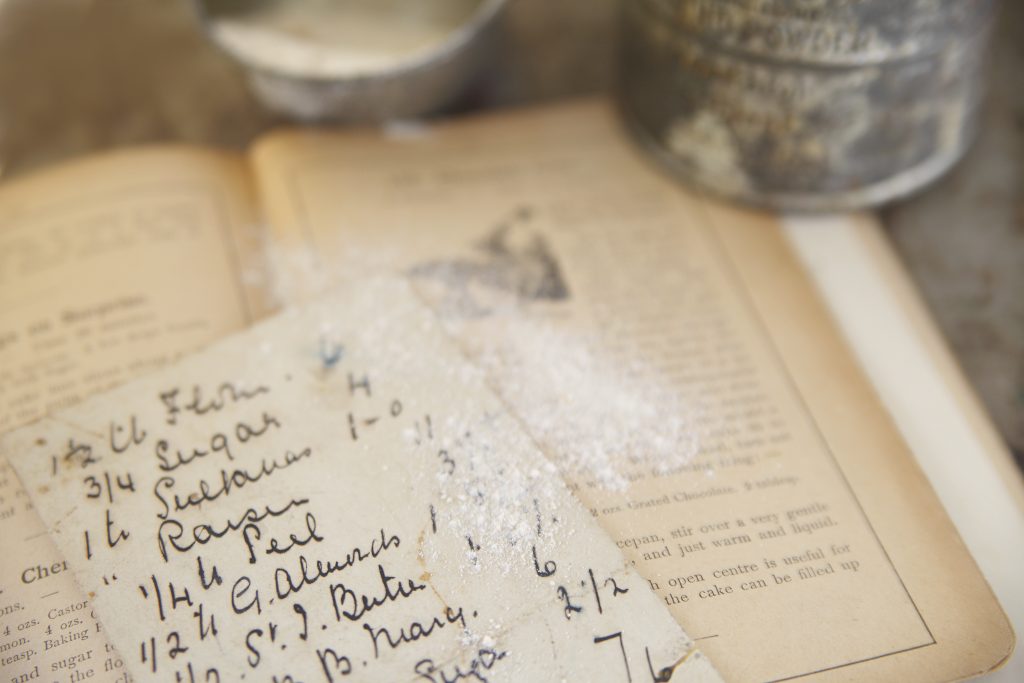
image from: pexels.com
R: There’s some really good ones in there. So a lot of the recipes in this book that I wrote were really based on my childhood. So. Really quick backstory. My mother wasn’t an amazing cook necessarily, but she was a really good baker. She made beautiful pies. She made cookies, you know, and when I was a kid growing up, we always had like kind of homemade stuff around. Cause my mom, she would do that. That’s what she did and anyways, so I lost my mom in 2008. She had cancer and anyway, so a few years ago, I don’t know what happened to this thing in the meantime. But somehow my mom had this recipe box with her recipes that she’d written on it and I don’t know exactly what happened to it, but anyway, it found its way back to me a couple of years ago. A lot of the recipes in this book were really inspired by the recipes in this box of recipes that are written in my mother’s handwriting and have all this gunk spilled on them. Obviously it had been used, you know, hundreds of times. So like really basic recipes, like chocolate chip cookies and peanut butter cookies and brownies, and like those things that are like those really basic kind of cookies that we kind of go for that we sort of grew up eating. So what I did was I took a bunch of those recipes and veganized them and because they were really good recipes, right. Like I remember making them and eating them when I was growing up. And so I just veganized a bunch of those and some of those became sort of some of the cornerstones of the book. So in terms of recipes that I’m really proud of. One of my absolute favorite recipes in the book is called. It’s called triple threat Ginger cookies. Yeah. So if you like a ginger cookie, these cookies have three different kinds of ginger in them. So they have raw, like actual graded ginger that is graded into the batter, into dough. Powder ginger and also you know ginger candy, some candy ginger, and then you chop it up and add that into the batter. At the end, they are so good. Like, if you’re a ginger lover, you will love these cookies. They’re so good.
Missing Mom’s Cooking, Saving Those Recipes
A: Well, thank you so much for sharing that beautiful story and sharing your mom’s recipes with the world. I lost my mom back in 2010, and she wasn’t a big baker, but I feel like moms, some are always have that box of recipes. That was so important to me when she passed. That was one of the things that I really wanted to make sure that.
R: Yeah. And I think, you know, for me, and also this all kind of poured into this book a little bit, and I’m sure you’ll agree with me. You know, there are ways that we connect ourselves to our family, whether our family is present or whether our family is gone. And some of my family is here and some of my family is not. But there are ways that we connect ourselves to our family. And so much of how we connect to our family is by gathering around the table and having a meal. You know, it’s not even so much always about the food as it is about just like having that moment with your family and how important that, how important that is, you know? And, and when I say family also, I use that term kind of loosely because maybe there are people that you’re. Related to, and maybe there are people you’re not related to, you know what I mean? Like we have chosen families to have these people in our lives that are part of our quote unquote family that we’re maybe not related to as well. But having that moment of sharing that time with them is. It’s indispensable, like, think about all those times when you had, you know, those times with your mom and the times that I think about that I had with my mom. And those are times that I, that live, you know, will always stay with me. Right.
A: Cause they were coming out core memories.
R: Yeah, really important. And then you go back and then you have that thing. Right. And you’re like, oh my God. I remember that time when my mom made ax, you know what I mean?
A: It’s like even the scent of the food when you’re cooking, it can bring you back to that time too. So what it really is, food can be this beautiful, I don’t know, memory maker for so many. Well,
R: It’s the vehicle. Right. Am I, I love that about like, for me, It’s such an important part of my life. And it’s such an important piece of my life in that way. Right. Because, to have that bond and have that experience together. Right.
How To Find Rebecca
A: What a great legacy item that you’re able to set or leave for him instead of him having to find necessarily about recipe box, he does have some all published, right?
R: It’s in a book and on my blog, yes
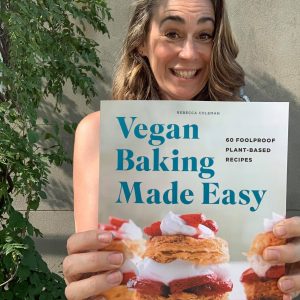
A: Where can everybody find your book?
R: They’re on Amazon. Both of them are on Amazon. So Vegan Baking Made Easy and then the other one is called Aquafabulous.
A: And where can everybody find you online?
R: I’m at cookingbylaptop.com.
A: Well, thank you so much for joining me today, Rebecca. I really enjoyed our conversation
R: So fun. That was a really fast hour!
A: Right?
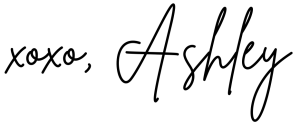

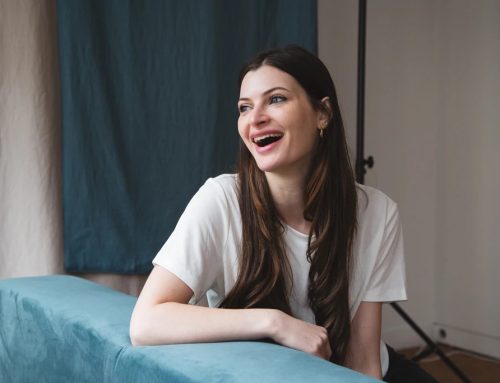
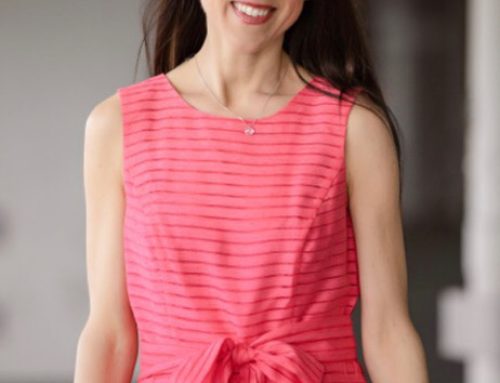
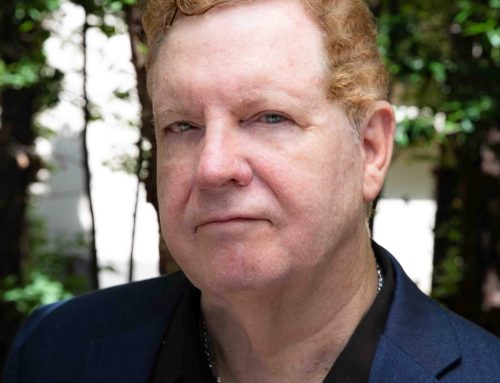
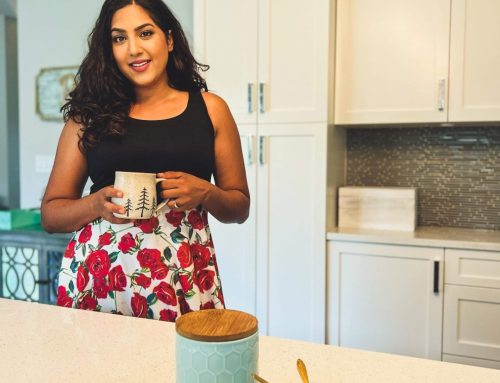
Leave A Comment